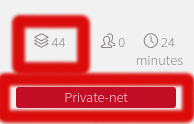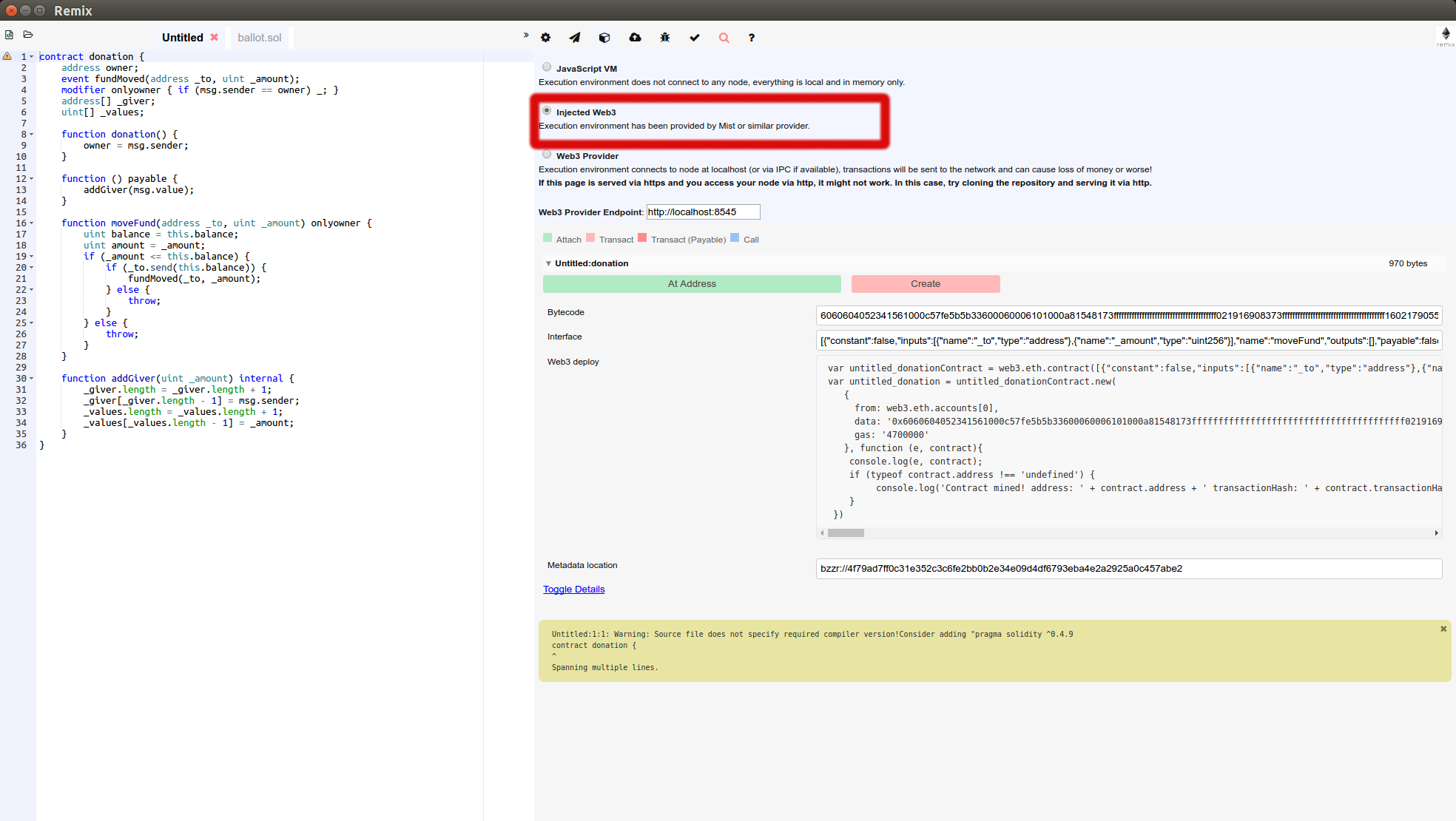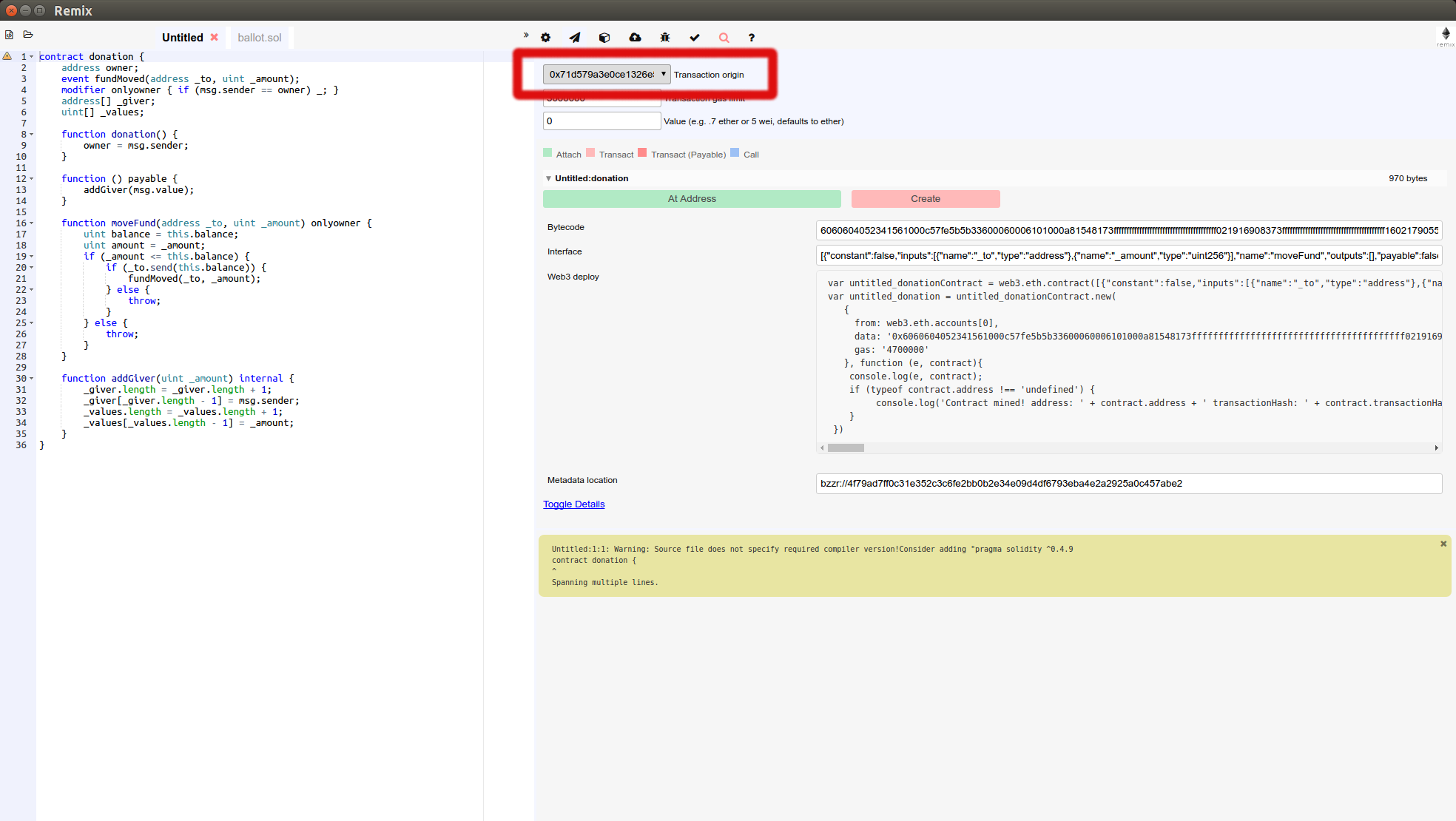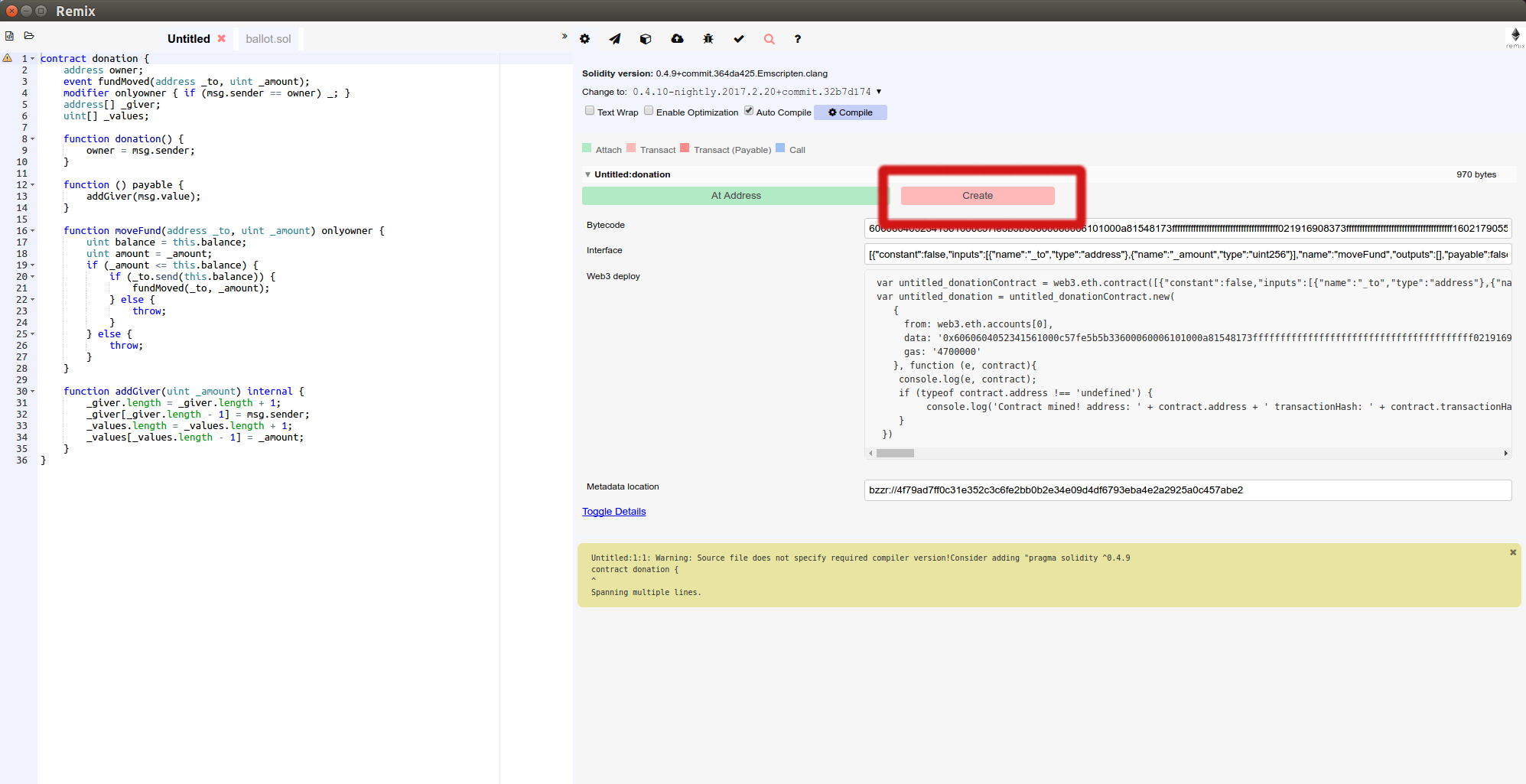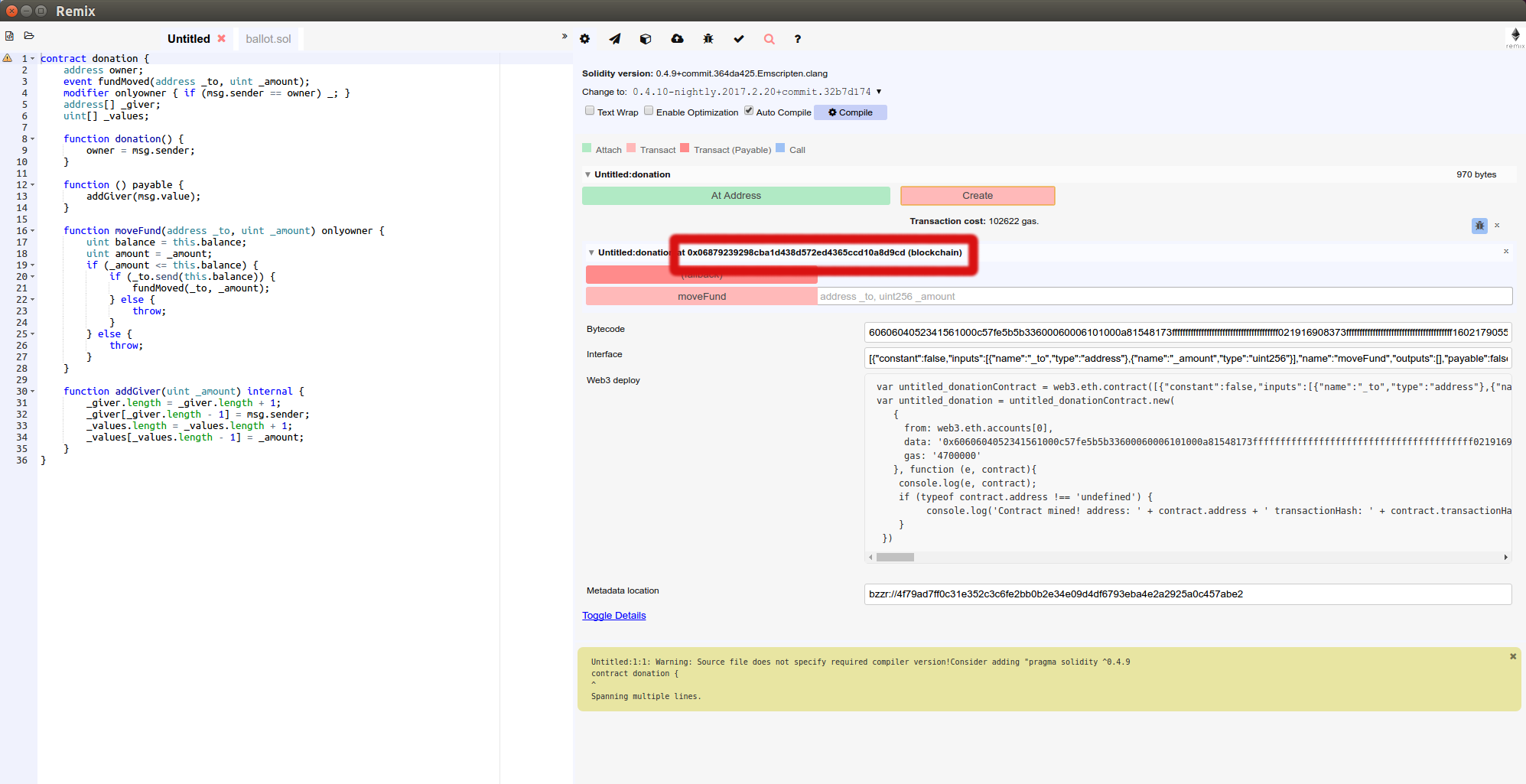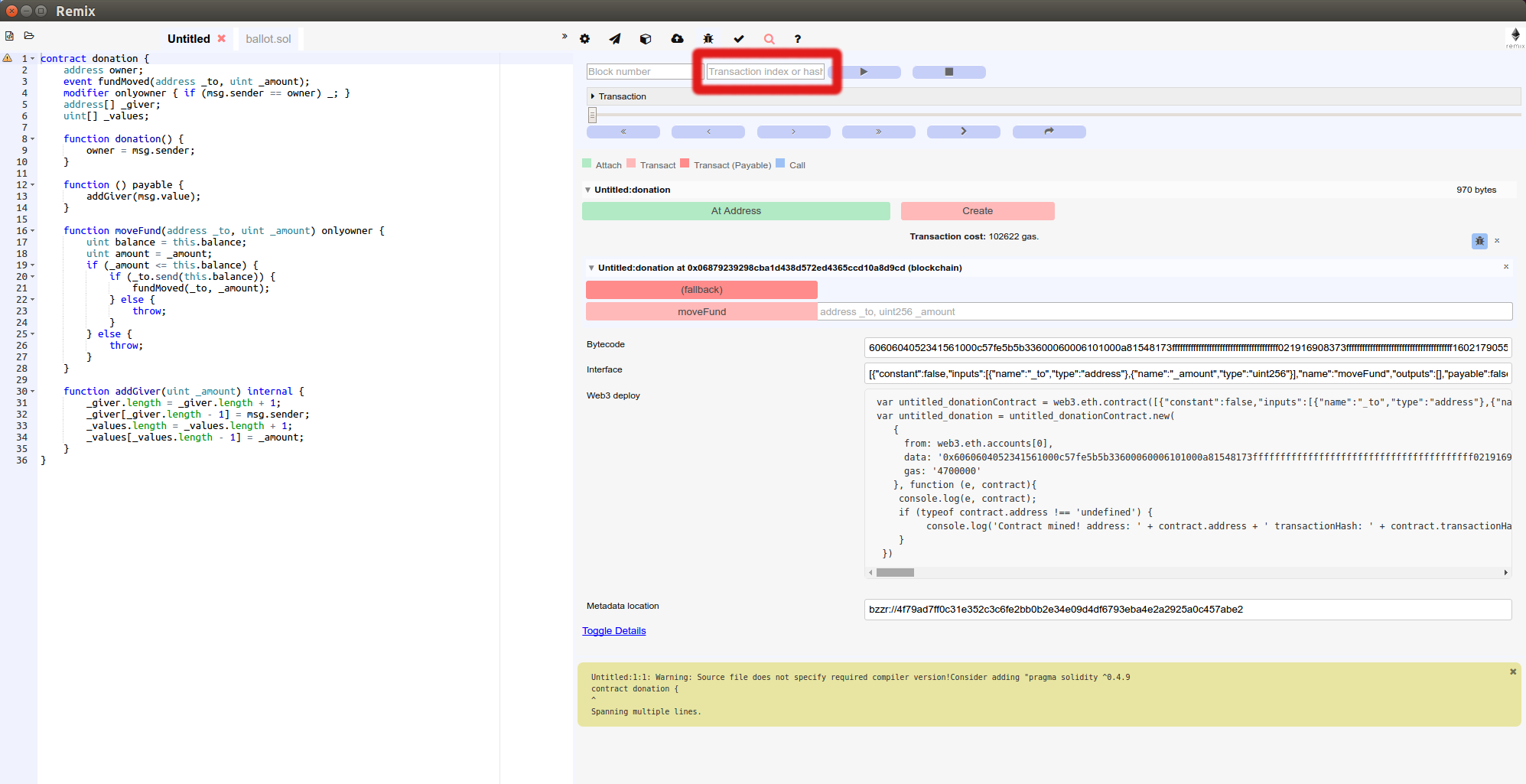9.9 KiB
Debugging a Dapp using Remix - Mist - Geth
The ultimate goal of this tutorial is to debug transactions that have been created by a dapp front end.
It is easy in Remix to debug a transaction created from its own GUI. However, setting up an environment that allows you to debug transactions created outside of Remix, require a bit more of complexity.
We will need four tools for that :
- Geth - this is the center piece and provides the blockchain environment. We will basically run geth in a dev mode.
- Mist - this is the Ethereum dapp browser. We will use it to browse our front end.
- Remix - this is the Ethereum IDE. We will use it to develop our Solidity contract.
- Any code editor you want - in order to write your front end :)
Install the environment
Install Mist
Mist is the Ethereum browser and the entry point of a Dapp.
Please download the latest version (at least 0.8.9).
Basically we will always run our front end in Mist (note that it is also possible to use Metamask).
Install Geth
Geth is the official Ethereum client.
Running the environment
Run Geth
We will run a test node. This node will have a new empty state and will not be synced to the main or ropsten network.
geth --ipcpath <test-chain-directory>/geth.ipc --datadir <test-chain-directory> --dev console
<test-chain-directory> is the folder where keys and chain data will be
stored.
--ipcpath defines the end point that other apps (like Mist) use to
talk to geth.
--datadir specifies the data directory.
--dev sets the node into private chain mode and adds some debugging
flags.
Then we need to create accounts and mine a bit to generate some Ether:
// from the geth console :
personal.newAccount() // You can execute this command several time if you need more than one account.
miner.start() // generate some Ether.
miner.stop() // stop mining after 30s-60s - we could also keep mining.
Next time we run Geth, we will only need to mine transactions (no need to recreate account).
Run Mist
If we run Mist without any argument, its internal Geth node will run. As we have our own we need to specify the ipc path of the node installed above.
mist --rpc <test-chain-directory>/geth.ipc
(yes the option is --rpc)
Once Mist is started, verify that it is connected to the test node (that's very important!!).
On the bottom left, check that the network is Private-net and that the
block number is the same as reported by the test node we are currently
running. Run the following command in the Geth Console to check:
web3.eth.blockNumber.
Clicking on Wallet will allow you to send transactions and check account balances (if you are currently mining you should see the balance increasing).
Starting Remix
In Mist click on Develop / Open Remix IDE
Remix will open in a new window. If this is the first time it is run,
the Ballot contract will be loaded.
Now, we need to check if Remix is connected to Mist:
Right panel / third tab from the left, Injected Provider should be
checked.
Right panel / second tab from the left, Transaction Origin should
contain accounts we have previously created in Geth.
Developing contract / front end
Donation contract - Dapp Back end
Here is a sample solidity contract.
Copy and paste the following inside remix:
contract Donation {
address owner;
event fundMoved(address _to, uint _amount);
modifier onlyowner { if (msg.sender == owner) _; }
address[] _giver;
uint[] _values;
function Donation() {
owner = msg.sender;
}
function donate() payable {
addGiver(msg.value);
}
function moveFund(address _to, uint _amount) onlyowner {
uint balance = this.balance;
uint amount = _amount;
if (_amount <= this.balance) {
if (_to.send(this.balance)) {
fundMoved(_to, _amount);
} else {
throw;
}
} else {
throw;
}
}
function addGiver(uint _amount) internal {
_giver.push(msg.sender);
_values.push(_amount);
}
}
Dapp Front end
and here is the front end:
<div>
<div>Donation Contract</div>
<br/>
<input id='contractaddress' placeholder='contract address'></intput>
<br/>
<div>
<br/>
<input id='fromGive' placeholder='from' ></intput><input placeholder='amount' id='valueGive'></intput><button id="fallbackbtn" onclick="donate()">give</button>
<br/>
<br/>
<input id='fromMoveFund' placeholder='from' ></intput><input id='moveFundTo' placeholder='move to' ></intput><input id='amountToMove' placeholder='amount' ></intput><button id="movefundbtn" onclick="movefund()">moveFund</button>
<br/>
<br/>
<div id='wait' ></div>
</div>
<br/>
<br/>
<div id='log'>
</div>
</div>
<script type="text/javascript">
function donate () {
var donation = contractspec.at(document.getElementById('contractaddress').value)
donation.donate({
from: document.getElementById('fromGive').value,
value: document.getElementById('valueGive').value
}, function (error, txHash) {
tryTillResponse(txHash, function (error, receipt) {
alert('done ' + txHash)
})
})
}
function movefund () {
var donation = contractspec.at(document.getElementById('contractaddress').value)
donation.moveFund(
document.getElementById('moveFundTo').value,
document.getElementById('amountToMove').value,
function (error, txHash) {
tryTillResponse(txHash, function (error, receipt) {
alert('done ' + txHash)
})
})
}
var contractspec = web3.eth.contract([{"constant":false,"inputs":[{"name":"_to","type":"address"},{"name":"_amount","type":"uint256"}],"name":"moveFund","outputs":[],"payable":false,"type":"function"},{"constant":false,"inputs":[],"name":"donate","outputs":[],"payable":true,"type":"function"},{"inputs":[],"payable":false,"type":"constructor"},{"anonymous":false,"inputs":[{"indexed":false,"name":"_to","type":"address"},{"indexed":false,"name":"_amount","type":"uint256"}],"name":"fundMoved","type":"event"}]);
function tryTillResponse (txhash, done) {
document.getElementById('wait').innerHTML = 'waiting for the transaction to be mined ...'
web3.eth.getTransactionReceipt(txhash, function (err, result) {
if (!err && !result) {
// Try again with a bit of delay
setTimeout(function () { tryTillResponse(txhash, done) }, 500)
} else {
document.getElementById('wait').innerHTML = ''
var log = document.createElement("div")
log.innerHTML = JSON.stringify(result)
document.getElementById('log').appendChild(log)
done(err,result)
}
})
}
</script>
I would suggest serving this file using http-serve, but you can use
any web server you like.
Example: Dapp Front End https://github.com/ltfschoen/dapp_front_end
Important notice !
The variable contractspec contains the abi of the donation contract.
This means that if you change something in the contract interface
(function names, parameters, ...) you need to copy the new abi from
remix to the front end.
Deploying
Right panel / Red button Create
This creates a new transaction that deploys the Donation contract
(Mist will ask for the usual passphrase check).
Wait for the transaction to be mined (don't forget to activate mining
miner.start()). Once this is done, you can use it by executing the
moveFund and donate function. But this is not what we want to
achieve. We want to run and debug those functions from the front end.
Remix also display the address of the contract. Save it, we'll need this address later.
Debugging
From Mist, browse the above front end. In the first field, paste the
address of the newly created contract. Now, let's call the first
function (label give).
You will need an account and a value.
The account could be any account that is declared in the Wallet section
of Mist. This is the sender of the transaction that we are going to
create. The value should be no more than the actual balance of the
account - the unit is in wei, so just put 100 (100 wei), that should
be fine.
Click on Give and wait for the transaction to be mined.
The HTML block with id log is filled by all the transactions created
from the front end. It was easier for the purpose of this tutorial to
just log transactions in a div but you can have your own logging
mechanism.
There is only one field that we need, this is the transactionHash.
Copy it and switch to Remix. On the right side, the fifth panel shows a small "bug" icon, that is the debugger.
Paste the hash into the transaction field and click on the play
button.
You are now entering a debug session for the call to donate.
Debugging in Remix is easier than with common tools like gdb because you can freely move in time. Use the slider to change the current step and click on the panels below to expand them and explore the curret state, local variables, etc. There are also breakpoints to move between sections of the code quickly, but more on all that later.
At the time of this writing, there is an issue that could break the contract creation. The a workaround for that at https://github.com/ethereum/go-ethereum/issues/3653 . Please follow the workaround or wait for this issue to be closed.
Also, although retrieving a contract's storage when Remix is using the JavaScript VM is working well, there is still work to be done when Remix is using eth or geth as backend.
